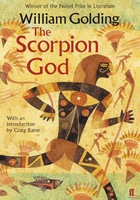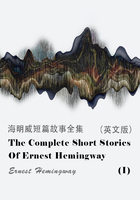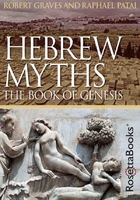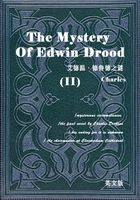THE PRIMEVAL MONSTERS DESCRIBED
(a) In the days before Creation, Rahab, Prince of the Sea, rebelled against God. When commanded: 'Open your mouth, Prince of the Sea, and swallow all the world's waters,' he cried: 'Lord of the Universe, leave me in peace!' Whereupon God kicked him to death and sank his carcase below the waves, since no land-beast could endure its stench.[49]
(b) Others hold that God spared Rahab's life, and that afterwards, when envious angels stole and threw into the sea 'The Book of Raziel', a compendium of divine wisdom which God had given Adam, He ordered Rahab to dive down and recover it. The Prince of the Sea obeyed without demur, yet later comforted God's enemies by supporting the Egyptians in their quarrel with the Children of Israel, and pleading for Pharaoh's army which God was about to drown in the Red Sea. 'Spare the Egyptians', he cried, 'be content with the rescue of Israeli' But God, lifting His hand, destroyed Rahab and all his helpers. Some style Rahab 'the Celestial Prince of Egypt'. Others do not distinguish him either from Leviathan or Oceanus; or from the boastful Great Dragon who claimed to have created all seas and rivers, but whom God hauled ashore in a net, with his progeny, afterwards shattering their skulls and piercing their sides. When they still would not die, He set guardians to watch over the Great Dragon, who will finally be despatched on the Day of Reckoning.[50]
(c) Leviathan's monstrous tusks spread terror, from his mouth issued fire and flame, from his nostrils smoke, from his eyes a fierce beam of light; his heart was without pity. He roamed at will on the surface of the sea, leaving a resplendent wake; or through its lowest abyss, making it boil like a pot. No weapon in the armoury of mankind could dint his scales. Heaven's inhabitants themselves feared him. Yet God caught Leviathan with a hook, hauled him up from the Deep, tied down his tongue with a rope, thrust a reed through his nostrils, and pierced his jaws with a thorn—as though he had been a river fish. Then He threw the carcase in the bottom of a boat and took it off, as if to market.[51]
(d) When God created fishes and sea-beasts from light and water, He allowed Leviathan, who was larger than all his fellows put together, to rule them from a throne raised on a colossal underwater rock. Some say that he had many heads, or that there were two Leviathans—the Fleeing Serpent and the Crooked Serpent—both of whom God destroyed. Others, that He spared Leviathan as being one of His creatures, but wholly tamed him (or ordered the archangel Jahoel to do so), and still deigns to sport with him on the wide seas for three full hours a day. Great sea-dragons serve as Leviathan's food. He drinks from a tributary of the Jordan, as it flows into the ocean through a secret channel. When hungry, he puffs out a smoky vapour which troubles an immense extent of waters; when thirsty, he causes such an upheaval that seventy years must elapse before calm returns to the Deep, and even Behemoth on the Thousand Mountains shows signs of terror. But Leviathan fears one single creature only: a little fish called Chalkis, created by God for the sole purpose of keeping him in check.[52]
(e) Others hold that Leviathan has been confined by God to an ocean cave, where the world's whole weight rests upon him. His huge recumbent body presses down on Tehom, which prevents her from flooding the earth. Yet, since sea water is too salt for Leviathan's taste, thirst often compels him to raise one fin; the sweet waters of Tehom surge up and he drinks awhile, then drops the fin again.[53]
(f) Some say that Leviathan has as many eyes as the year has days, and radiant scales that obscure the very sun; that he grips his tail between his teeth and forms a ring around the Ocean. The firmament's lower band, which carries the signs of the Zodiac, is therefore also called 'Leviathan'.[54]
(g) Few men have ever been granted even an inkling of Leviathan's bulk; but once Rabh Saphra, as he sailed in a ship, saw a two-horned beast lifting its head from the waters. Engraved upon the horns he read: 'This tiny sea-creature, measuring hardly three hundred leagues, is on his way to serve as Leviathan's food.'[55]
(h) Some sages reconcile the rival traditions that God killed, and did not kill Leviathan, by believing Him to have created both a male and a female. According to these, God butchered the female and gelded the male, to prevent them from mating and thereby destroying the world—they say it would have been unseemly for Him to kill the male and sport with the female… When this lonely survivor sees God approach, he lays aside his grief; the righteous, watching the play, are likewise cheered by anticipation of what awaits them—knowing that on Judgement Day they shall banquet off its flesh. From the female's hide, God made bright garments to clothe Adam and Eve; and preserved her flesh in brine for the same banquet.[56]
(i) Leviathan, like Rahab, exudes a fearful stench. Were it not that from time to time the monster purifies himself by sniffing the sweet flowers of Eden, all God's creatures would surely stifle.[57]
(j) Those who hold that Leviathan's life was spared, foresee a great angelic hunt in which he is the quarry. Yet even the boldest angels must flee from him as he stands at bay; and, if they rally to the attack, can only blunt their weapons on his scales. When, at length, Gabriel tries to haul him out of the Deep to which he has returned, Leviathan will swallow hook, line and fisherman. Then God in person must net and slaughter him.[58]
(k) God will not only prepare a magnificent banquet from Leviathan's flesh, distributing for sale in the streets of Jerusalem what the righteous cannot eat, but make them tents from his hide, and adorn the city walls with what is left—until they shine to the ends of the world.[59]
(l) Others predict a duel between Leviathan and Behemoth. After an earth-shaking struggle on the sea-shore, Behemoth's curved horns will rip Leviathan open, while Leviathan's sharp fins mortally stab Behemoth.[60]
(m) Yet others hold that Leviathan was to have been Behemoth's mate; but that God parted them, keeping Behemoth on dry land and sending Leviathan into the sea, lest their combined weight might crack Earth's arches.[61]
(n) Behemoth, the first land-beast created, resembles a prodigious hippopotamus: with a tail bigger than the trunk of a cedar, and bones like pipes of brass. He rules the land-creatures, as Leviathan those of the sea. They gambol around him, where he takes his ease among lotus, reed, fern and willows, or grazes on the Thousand Mountains. It is disputed whether Behemoth was fashioned from water, dust and light, or simply told to arise from Earth; also, whether he was born solitary, or once had a mate, as have all living creatures.[62] Some say that if Behemoth did possess a mate, he cannot have coupled with her: since their offspring would surely have overwhelmed the world. Others, that God prudently gelded the male and cooled the female's ardour; but spared her until the Last Days, when her flesh will delight the righteous.[63]
(o) God lets Behemoth graze on the Thousand Mountains, and though he crops these bare in a single day, yet each night the grass grows again and, by morning, stands as high and rank as before. Behemoth is said to be a flesh-eater also: the Thousand Mountains supporting with their pasture many beasts that serve as his food. Summer heat makes him so thirsty that all the waters flowing down Jordan in six months, or even a year, barely suffice for a single gulp. He therefore drinks at a huge river issuing from Eden, Jubal by name.[64]
(p) Behemoth is called 'the Ox of the Pit.' Every year, at the summer solstice, he rises on his hind legs, as God has taught him, and lets out a fearful echoing roar that restrains all wild beasts from preying on man's flocks and herds for the next twelve months. He will often raise his great bushy tail and let the birds of the air take shelter there; then lower it gently and let the beasts of the field do likewise. Behemoth, despite his enormous strength, is as merciful as a good king should be: solicitous that none of the birds shall be harmed by their fellow-subjects, the beasts.[65]
(q) Although some believe that Leviathan and Behemoth will murder each other, it is predicted by others that God will send Michael and Gabriel against both creatures and that, when they fail to despatch either, He will shoulder the task Himself.[66]
***
1. God's watch over the Great Dragon even after its death, and His restraint of Tehom by use of a magical sherd (see 4. k), recall the Enuma Elish, where Marduk sets watchers over Tiamat's carcase to prevent an escape of water.
2. Leviathan, in some aspects, resembles a whale; in others, a crocodile. Why he is called 'the Celestial Spirit of Egypt', and why Ezekiel (XXIX. 3) calls Pharaoh 'the great dragon that lies among his rivers', can be seen from a victory song in honour of Thotmes III: 'I let [the vanquished peoples] behold your Majesty in the likeness of a crocodile feared in the waters, which no man dares approach.'
3. Crocodiles were worshipped at Crocodilopolis, Ombos, Coptos, Athribis and Thebes. Their mummies have been found in several Egyptian cemeteries. According to Plutarch, crocodiles were believed to lay their eggs exactly above the level of the next Nile flood—a great assistance to farmers who came across them. Crocodiles were also native to Palestine, and survived in the River Zerka until the beginning of this century. A small Gnostic stele from Caesarea shows them being hunted; according to Diodorus Siculus, they were caught on baited hooks, and killed with iron forks, though seldom, because of their sanctity. He wrote that the crocodile feared only the ichneumon, a creature no bigger than a little dog, which ran up and down the banks of the Nile breaking their eggs for the benefit of mankind.
The chalkis, a substitute for the ichneumon in Jewish tradition, is a gregarious fish. Some commentators make it a sardine, others a herring: which seems an apter choice, because in Northern European folklore the herring is preferred to the whale as King of the Sea.
4. Leviathan perhaps borrowed his stench from Tehom-Tiamat, whose name seems to have been connected by early popular etymology with the Arabic tahama ('stinking'), and Tihama, a name for the low-lying southwest Arabian shore. This etymology would have been strengthened by the phenomenon of a stranded whale: no dead animal smells stronger.
5. Behemoth resembles a wild ox in so far as he roved on the Thousand Mountains—doubtless at the sources of the Nile—and would one day rip Leviathan open with his curved horns. For the most part, however, he is a hippopotamus. Herodotus, Diodorus and Pliny, in writing of the Nile, all pair the hippopotamus and crocodile. That the hippopotamus has enormous strength, frequents the reedy parts of rivers, can stay under water for as long as ten minutes, but is herbivorous and therefore inoffensive to other beasts, agrees with the account of Behemoth in Job XL. 15–24. According to Herodotus, the female hippopotamus was worshipped at Pamprenis as Set's wife. She was called Taurt ('the great one'), and made patroness of pregnancy, but never humanized like other animal deities. Diodorus notes that it would be disastrous to mankind if hippopotami were to breed unmolested, and that some Egyptians therefore harpoon them. Possibly this comment and Diodorus's praise of the ichneumon's concern for the future of mankind has suggested the inevitable castastrophe if Leviathan and Behemoth were to mate. The mild hippopotamus caused such damage to Nile crops that by Roman times it had been practically exterminated.
6. Both crocodile and hippopotamus were sacred to Set, and supernatural pictures of them in the Egyptian Book of the Dead, which honours Osiris, Set's enemy, may have prompted Jewish mythologists to identify them with the Babylonian monsters.
7. Crocodiles and hippopotami are, according to Diodorus, all but inedible, but Herodotus says that they were sometimes eaten, presumably at an annual totem feast: hence the flesh of Leviathan and Behemoth reserved for the righteous on the Last Day. The poor of the Middle East have always hungered for flesh feasts to supplement their predominantly cereal diet.
8. Oceanus, whom Hesiod makes the eldest of the Titans and father of three thousand rivers, and whom Homer calls a god inferior only to Zeus, was supposed to girdle the earth like a serpent, just as the Zodiac girdles the sky. He was thus readily identified with Leviathan, the Great Dragon and Rahab; Scandinavian myths also make him a dragon. His appearance on the coins of Tyre, a city against which Isaiah (XXIII. 1–18), Amos (I. 10) and Joel (IV. 4) prophesied destruction, may account for the brutal kick which God dealt him (see 4. h).
9. The many-headed Leviathan of Psalm LXXIV. 14, is the seven-headed monster on Hittite cylinder seals, and mentioned in Ugaritic mythology. It also occurs on a Sumerian mace-head, and on a Babylonian seal from the third millennium B.C.
10. Mythical water-monsters in relief decorate six small panels at the base of the Menorah candelabrum shown on Titus's triumphal arch at Rome. This arch commemorates his sack of Jerusalem in 70 A.D. King Solomon had placed five such golden candelabra on either side of the Great Altar, besides supplying silver ones. When Nebuchadrezzar destroyed the Temple in 586 B.C., he took them all away. Some decades later, another golden Menorah stood in the Second Temple, built by Zerubbabel. This, in turn, was carried off by Antiochus Epiphanes, King of Syria (175–163 B.C.), but replaced by Judas Maccabeus. Close correspondences between the candelabrum shown on Titus's Arch and the account in Exodus of the pre-Exilic Menorah suggest that, though the author of Exodus has described no more than stem and branches, yet the monsters of the Maccabean Menorah also occurred on the Solomonic one.
11. The Menorah's cosmic significance was first mentioned by Zechariah (IV. 10), who had learned in a vision that its seven lamps were 'the eyes of Yahweh that run to and fro through the universe', namely the seven planets (see 1. 6). This View was endorsed by Josephus and Philo, contemporaries of Titus, and by midrashic writers of two or three centuries later. The annual lighting of the Temple candelabra at the autumn festival will have commemorated God's creation of stars on the fourth day: because the Menorah's central stem rises into the fourth branch, and because Babylonian priests held the fourth planet sacred to Nabu who invented astronomy. Probably, then, the Menorah monsters represent those which God overcame before He began His work of Creation.
On the lower left panel, a pair of dragons face each other in similar positions, though their wings and tails differ. These may be read as two Leviathans: the Fleeing Serpent and the Crooked Serpent. The symmetrical and identical fish-tailed creatures with somewhat feline heads shown in the top left and right panels are, perhaps, the 'great dragons' of Genesis I. 21. The dragon on the lower central panel, with its head twisted haughtily up and backward, suggests Rahab ('haughtiness'). An indistinct monster on the lower right may be Tehom or Ephes. A relief on the top central panel vaguely resembles the familiar pair of Phoenician winged creatures always shown facing each other: possibly they are cherubim, God's messengers, whose effigies surmounted the Ark of the Covenant. It may have been in memory of these reliefs that a second-century Tannaitic rule explicitly forbids representations of dragons with spikes protruding from their necks as being emblems of idolatry, though smooth-necked dragons, such as those shown on the base of the Menorah, are permitted (Tos. Avodah Zarah, V. 2).
12. Solomon is said to have won much of his wisdom from the 'Book of Raziel,' a collection of astrological secrets cut on sapphire, which the angel Raziel kept. The idea of a divine book containing cosmic secrets appears first in the Slavonic Book of Enoch (xxxiii), which states that God had written books of wisdom (or, according to another version, dictated them to Enoch), that He then appointed the two angels Samuil and Raguil (or Semil and Rasuil) to accompany Enoch back from heaven to earth, and commanded him to give these books to his children and children's children. This may well be the origin of the 'Book of Raziel' which, according to Jewish tradition, was given by the Angel Raziel to Adam, from whom it descended through Noah, Abraham, Jacob, Levi, Moses and Joshua until it reached Solomon. According to the Targum on Ecclesiastes X. 20: 'Each day the angel Raziel standing upon Mount Horeb proclaims the secrets of men to all mankind, and his voice reverberates around the world.' A so-called Book of Raziel, dating from about the twelfth century, was probably written by the Kabbalist Eleazar ben Judah of Worms, but contains far older mystical beliefs.















